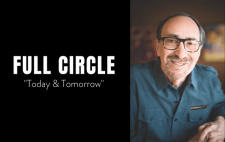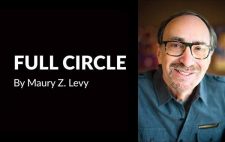I never knew why he never told me.
By the time I learned to ride a two-wheeler, my father was ancient. Close to 50, back when 50 was the old 50. His legs were shot, his back was busted. He was in no shape to run after my bike or play ball with me. I just thought he wasn’t very athletic. And I envied kids who had fathers who were younger and not broken.
It wasn’t until after he died that I found his high school yearbook, a book he’d never shown me, a book full of old newspaper clippings from his youth in Newark. However yellowed, the clippings told a whole different story. He was a sports star, my father. He played basketball and baseball and he ran track.
The headlines said it all. “Levy Scores 16 to Lead Team to Championship.” “Levy’s Home Run Wins Playoff Game.”
I never knew. And I wish I had. But that wasn’t the only thing I didn’t know about him. We did have a few things together, just the two of us. We had Phillies’ games on Sunday. We had Friday night fights. And each summer, we had one glorious day at the Shore.
My father was a horse. When it came to work, nothing stopped him. Not two back surgeries. Not double hernia operations. Not feet that hurt like hell.
In the summer, a torn leather sample case in each hand, he walked the length of every boardwalk at the Shore.
The highlight of my summers as a kid was when he took me on one of those trips. Usually to Atlantic City, where the water smelled like salt and salt water taffies smelled like heaven.
He made just enough room in the old Chevy wagon for me to sit in the front, as he drove like crazy over the barren back roads. Time was money. Although, he didn’t work on commission, just on hope. Hope that the boss would be so impressed with how much he sold that he might give him a bonus come Christmas time. Of course, that rarely happened.
Still, he managed to squirrel away enough money to pay for my sister’s house, my brother-in-law’s business and my college education. Everything else got pinched.
In Atlantic City, we walked by all the best restaurants because they were “too damn expensive.” My lunch on those days was a hot dog from one of the boardwalk stands. And if I didn’t complain too much about the walk or the heat, there would be a custard cone with my name on it at Kohr’s.
One day, we sat down on one of the boardwalk benches to rest for a minute.
“How you doin’, pal?” he asked me.
“I’m tired,” I said.
“You’re tired? You’re 10 years old. I’m almost 60. You can’t be tired. You have to keep going. That’s a life lesson for you.”
I took the minute to ask him about himself, something he never talked about. “Dad,” I asked. “What did you do in the war? Did you just sell toys?”
Just about all the other kids had fathers who were veterans.
“Well,” he said, “I volunteered for the Army when the war started. You know what they told me?”
I didn’t know.
“They told me I was too old to serve. Too old. Do you know what I did then?”
I didn’t know.
“I quit my job at the 5&10 and went to work at the shipyard. I built the war boats for the younger guys.”
“Wow,” I said. “Did you do the big guns?”
“That’s exactly what I did. You have to have a steady hand to do that, you know. Those are the guns that won the war.”
Wow, I thought. My father didn’t just work in a toy store. My father was a real American hero. I smiled. He put his arm around me. Life was good.












